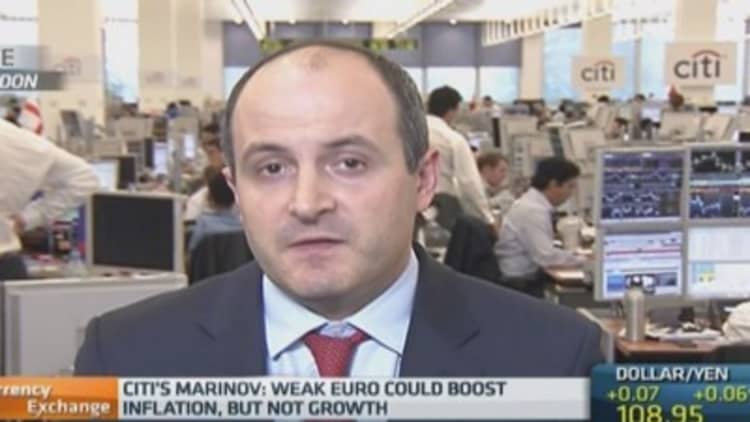The European Central Bank will this week unveil details of its plan to save the eurozone from economic stagnation by buying hundreds of billions of euros-worth of private-sector assets. But one of the most crucial questions surrounding the purchases of bundles of loans, known as asset-backed securities, looks set to remain unanswered for some time.
The governing council will meet in Naples, where it is expected on Thursday to reveal which asset-backed securities and covered bonds the central bank plans to buy to revive growth and boost inflation. Analysts say inflation is likely to have fallen to a five-year low this month.
The purchases will work in tandem with the central bank's offers of cheap four-year loans, under what it dubs its targeted longer term refinancing operations, to bloat its balance sheet by as much as €1tn between now and the end of 2016.
Read MoreWhile ECB struggles,Fed sees recovery
But one of the most vital pieces of information about the programme will almost certainly be missing.
Whether the ECB can buy the riskier parts of securitisations, the so-called mezzanine tranches, is up to governments. With the new European Commission not yet in place, eurozone finance ministers are unlikely to discuss the issue until the end of October, with a decision weeks later. The early indications are that Germany and France will not support the plan.
The ECB's president, Mario Draghi, said earlier this month that the central bank would buy the safest slices of securitisations, known as senior tranches. But the ECB is cautious of taking too much risk on to the central bank's balance sheet. To avoid that, Mr Draghi said the ECB would buy the mezzanine tranches only if governments would guarantee any losses.
More from FT:
German concern at US/Canada trade deals
Eurozone recovery stutters in September
Draghi defends ECB lending scheme
Even before the details have been announced, there are already signs that the ECB's buying spree is breathing life into a market that has been moribund since the financial crisis left its reputation in tatters. Spreads have tightened on new deals and investors who have until now avoided Europe's securitisation market, such as sovereign wealth funds and other central banks, have had their interest piqued.
David Covey, head of European ABS strategy at Nomura, said: "The ECB's backing is bringing a legitimacy to the [European] ABS market."
Mr Draghi has stressed European securitisations have proven much safer investments than their US equivalents, which spread problems in one corner of the US mortgage market to the rest of the global financial system, earning the industry the moniker of "toxic sludge".

Yet, while default rates has been much lower here, activity in the European market has remained subdued since the peak of the crisis in 2008. That means ECB could struggle to buy enough ABS to expand its total balance sheet towards the €3tn target indicated by Mr Draghi from its current level of around €2tn.
Ebrahim Rahbari, a European economist at Citi, said: "There is a pretty big drag on the balance sheet from repayments of earlier offers of three-year loans from the central bank and the maturing of its earlier asset purchases. Whatever you do to make up that decline needs to be north of a trillion. Doing that with the TLTROs and the asset purchases is a tall order."
Read MoreLotsof 'ticking time bombs' out there: Sternlicht
The Association for Financial Markets in Europe, a trade body, puts the total size of the European market at €662.4bn. Banks have also retained another €726.8bn of securitisations on their own balance sheets, often using the bonds as collateral for the ECB's cheap loans. An important question is how willing the central bank is to buy these retained ABS directly from lenders.
Mr Draghi believes the ECB's entry into the market will trigger a wave of issuance. But analysts argue that unless the ECB has the support to buy the riskier slices of securitisations, a leap in activity is unlikely.
"If the ECB only buys senior tranches, it only really helps banks on the funding side and not the capital side. Most of the capital relief would only come from the sales of the mezzanine tranches," Mr Covey said. But banks already have options for cheap funding: the TLTROs allow them to borrow for four years for little more than the ECB's main refinancing rate.

